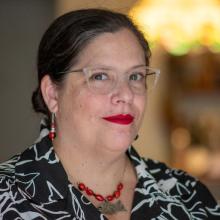Resuming Mobility: Between Great Expectations and New Fragilities

As I sit in my office in Buenos Aires, a cup of tea in one hand and my eyes fixed on this white screen, I cannot help but writing bluntly the first obvious observation: This postpandemic 2022 has been indeed intense and complex.
Not only are we recovering from a “critical incident” that shocked us so deeply, but there are wars and new conflicts that frame our work. Traveling has new requirements and hazards; visas and airports delays have been stressful and disruptive. We also have new programs and ways of doing things that the pandemic brought about with that explosion of innovation and creativity. There are new online programs, new development and delivery of hybrid and flex programs, and new and exciting realities that are expanding and revitalizing the field. We are back to in person work, in person travel, in person fairs, in person exchanges.
But we have changed. We can feel the renewed appetite for collaboration and reconnection, but I also recognize there are some new collective anxieties.
A Critical Incident
We cannot underestimate the emotive power of change after a critical incident, as a specific unplanned experience that can be categorized as a crisis, with deep repercussion in our security and health that served as a catalyst for changes in professional thinking and behavior.
The pandemic, and the paths out of it, hold significance even beyond what we choose to recount. But even two people exposed to the same elements can internalize them in very different ways. Some emerged from the pandemic fearless, with the will to push forward and gain the lost time. Others emerged more aware of fragility, somewhat humbled and prudent. But I think we are all more reflective and are now taking the time to ponder the lessons learned while acknowledging the scars.
Along these lines, my focus is on students: on their post pandemic experience and the changes in their behavior towards international programs. I’ve seen a mismatch between the needs and expectation of this post pandemic generation and the way we are “wired” to work in international offices.
I seek to understand if there are a trends that are more than a reaction to the shock, how that might affect our work in the future. Either way, many of the values that shape our work as international educators are more important than ever: equity, honesty, caution, and prudence.
Excited and Weakened
During the pandemic, humanity retreated into the “digital cave” to preserve itself, and online existence has been the lifeline that kept us connected, enabling the many significant advances we now celebrate. But it also reduced the experience of human contact to flickering fragments. Students were struggling with isolation and boredom. “Boredom,” says Han in The Burnout Society, “loosens the structures of the personality (...) things shine, vibrate at the edges, lose resolution" and for us the limits of identity and desire become porous.”
Maybe while the world was suddenly stopped and we were locked at home, we seemed to have arrived at a powerful conclusion: when the wheel starts again, the greatest desire is to be back on, full speed. We craved it and imagined it and kept referring to it as a “new normal.” Our interconnected world offers never-ending stimuli and opportunities, where everything is possible.
However, as much as these calls to actions fill us with vitality, they also weaken us. Especially in the formative years.
I can almost hear students whisper to themselves: “Ok, if everything is possible, then how do we find what is worth doing? How do I discover the one thing that makes sense to me, my purpose and how do I take that decision?” Students are hyper-excited but more fragile, and decision fatigue is kicking in hard.
In the international office, we emerged from the pandemic with massive demand, explosive interest in outgoing students. We still have big numbers of committed, dedicated students with an open mindset looking for opportunities to expand their horizons. However, we are also discovering an emerging new profile of very talented students with a noticeable shift in attitude.
They come as unstoppable forces of nature ready to reconquer the world—but on their own terms, with complete freedom and enjoyment. It is as if the adventure of discovery has become a desirable commodity, but it is desired with a consumer’s approach. It needs to be ready, simple, tailored, and bespoke. Students seem to have less tolerance for limits and rules, and they insist on flexibility.
But we often catch a glimpse of sadness in the corner of those eyes. Desire is clearly hypertrophied, but there is a lack of clarity in terms of purpose. They are excited to have access to the international experiences, but the reasons for choosing this destination, that university, and a given set of courses can be unclear. Sometimes underprepared for these new experiences, it can feel like attending a music festival without knowing the line-up of musical acts.
In the face of anxiety and uncertainty, they run calculations of all available options, wishing for an app to provide an algorithm to their perfect experience abroad, like a Netflix suggestion to predict what they’ll enjoy based on past viewed content.
And there is FOMO: the fear of missing out. That constant watch over the shoulder, the desire that nothing escapes them. The need to be accepted, to be in, to be wanted. The worry about peers’ thoughts and what are others doing. Students rarely come alone to the info sessions; they seem to need the reinforcement of friends during the decision-making process. We experience an increasing number of “group applications” due to a mix of anxiety, fear of going abroad alone, and the need for social reaffirmation.
The expectation of international mobility becomes a desirable experience, a must-have, and content to be shared in a constructed Instagrammable life. Once again, I agree with Han when he reminds us that “in social networks, the function of ‘friends’ is primarily to heighten narcissism by granting attention, as consumers, to the ego exhibited as a commodity.”
Emerging Stronger
When discussing these new challenges with my team at the international office, the outgoing coordinators reflected on the values that have been particularly important for them during 2022. These three came clearly to sight:
Equity, as in treating all students equally, taking their context and needs into account so that they get fair treatment. Is a value we needed to resort to when students push for exceptions (accepting applications after deadlines or requesting destinations outside the order of merit).
Honesty as a quality in people that make them act with righteousness and coherence, respecting the rules to achieve harmonic relations with others. We had to refer back to our processes on several occasions to explain to the students what was within our possibilities of action and what requirements were beyond what our office can solve. Calmness, firmness, and patience were a key triad to navigate those demands.
Caution and prudence are important to make sure we are assessing and controlling risks in each decision. Every communication with students and every decision considering the requests for exceptions needs to be pondered, taking equity and justice into account at all times.
The elixir of a diverse, open, joyous life is still as appealing to students as before. But the freezing fear of missing out on something and the painful unawareness of what they need, want, and how to make it happen are causing huge anxiety on students. We do not bring quick fixes. Being a consistent, stable, and empathic beacon of service in a midst of confusing circumstances is proving more and more important to help students navigate a sea of new fears and fragilities.
We need to keep placing the value of genuine human contact at the center of our work as international educators. We have our own scars to deal with, too, but this generation of students needs us as never before. •
Soledad Zapiola is the executive director of international programs at Universidad de San Andrés in Buenos Aires, Argentina.
About International Educator
International Educator is NAFSA’s flagship publication and has been published continually since 1990. As a record of the association and the field of international education, IE includes articles on a variety of topics, trends, and issues facing NAFSA members and their work.
From in-depth features to interviews with thought leaders and columns tailored to NAFSA’s knowledge communities, IE provides must-read context and analysis to those working around the globe to advance international education and exchange.
About NAFSA
NAFSA: Association of International Educators is the world's largest nonprofit association dedicated to international education and exchange. NAFSA serves the needs of more than 10,000 members and international educators worldwide at more than 3,500 institutions, in over 150 countries.
NAFSA membership provides you with unmatched access to best-in-class programs, critical updates, and resources to professionalize your practice. Members gain unrivaled opportunities to partner with experienced international education leaders.















